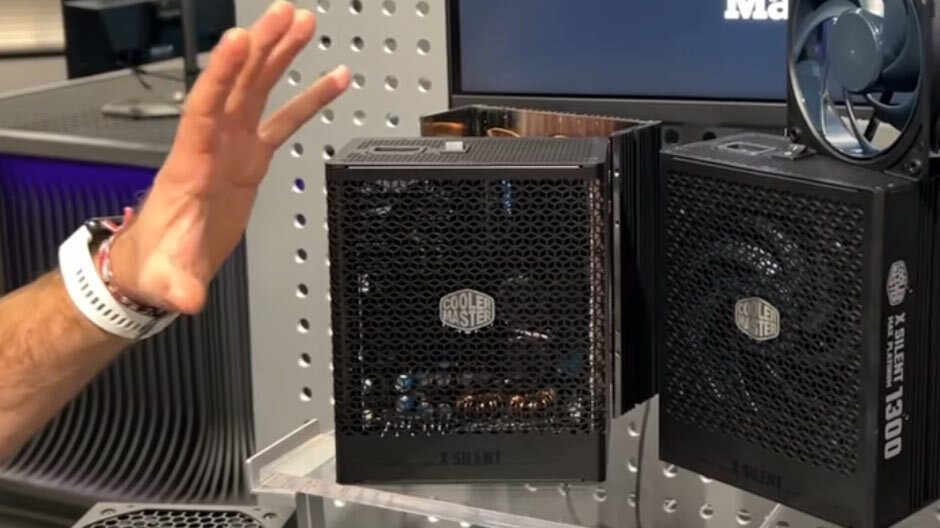Search the Community
Showing results for tags 'power supplies'.
-
A new device - essentially a docking station with a built-in power supply - may give some indication as to what the chargers for the best laptops of the future may be. The Sparkle TC-9321L docking station is fitted with two USB-C ports (one 3.2 and one 2.0), two USB-A 3.2 Gen2 port, HDMI and Ethernet ports, alongside SD card and microSD card slots. But the most remarkable aspect of this device is its built-in power supply that can provide up to 60W of power to devices from its USB-C port. The device is compatible with Windows and MacOS devices, alongside Chromebooks, Android smartphones, and tablets, as well as iPhones and iPads equipped with USB-C 3.2 Gen2 ports, according to PC Watch. As such, it can be used with macOS 11.3 or later, Windows 10 or later, Chrome OS, Android, iPadOS, and iOS 17.0.2 or later. The laptop power supply of the future Its dimensions of 78 x 152 x 36mm also means it’s fairly compact, with its 324g weight also making it ideal for hybrid workers and those who want to work on the move – and even means they don’t need to take their power units with them. The Sparkle is an impressively sized and functional docking station as it is, but the addition of up to 60W of power supply as a feature means it could make conventional notebook chargers with weighty power bricks a thing of the past. It could also even come to replace the best portable laptop battery chargers and power banks. People who need to work on the go, particularly using some of the best business laptops, tend to look for machines that are thin and lightweight, but this often means compromising in terms of functionality. By incorporating a host of ports into what is effectively the charger, those looking for the smallest and thinnest laptops need not compromise on functionality any longer. Such a device could also make the laptops of the future even thinner and lighter – not only by removing all superfluous ports but also by incorporating additional components, such as the GPU, or even additional storage for use in backups, for example. More from TechRadar Pro These are the best portable power stations you can buy todayCheck out the best laptop docking stationsWe've rounded up the best laptop docks for the MacBook Pro View the full article
-
- power supplies
- docking stations
-
(and 2 more)
Tagged with:
-
“Power Supplies” have different types of ratings. Here, the 80+ certification comes into consideration which ranges from the lowest, i.e., bronze, and climbs up to the titanium rating. The 80+ certification ensures that under 20%, 50%, and 100% load, the power supply will transform at least 80% of the “Alternating Current(AC)” to “Direct Current(DC)” as the normal power supply never converts the entire 100% current. This write-up will discuss: What is Power Supply? What Does Power Supply Rating Imply? Types of Power Supply Ratings. How to Nominate an Optimal Rating for a Power Supply? What is Power Supply? A power supply is a component/module that provides power to the electric load(s). It transforms one type of electrical power into another. It can transform solar or mechanical energy into electrical form of energy. The power supply works in such a way that when the system is powered on and utilizing electricity, the “Power Supply Unit(PSU)) transforms the DC power to AC. What Does Power Supply Rating Imply? The power supply rating corresponds to the energy efficiency of the “PSU”. The power supply certified by the “80 Plus” standard will provide at least 80% power efficiency at 20, 50, and 100% load. This particular standard is used to evaluate the system’s power supply based on reliability. What Factors to Consider While Opting for Power Supply Rating? The following variables can be considered to analyze what power supply rating will work best for your system: Electricity rates Temperature Budget Types/Forms of Power Supply Ratings Let’s overview the below-listed power supply ratings one by one: 80 Plus Silver 80 Plus Gold 80 Plus Bronze 80 Plus Platinum 80 Plus Titanium 80 Plus Silver “Silver-rated” power supplies are not that common. The “Power Supply Units” having the Silver rating are rated for 85% efficiency at 20% load and 88% efficiency at 50% load. 80 Plus Gold The majority of the mid-range to high-range systems utilize an “80 Plus Gold” rated power supply due to the phenomenal reliability and reasonable cost. These power supplies are rated for 87% efficiency at 20% as well as 100% load, identical to Silver, and 90% efficiency at 50% load. 80 Plus Bronze “Bronze-rated” power supplies are reliable and more reasonable compared to Gold-rated power supplies in terms of cost. These particular power supplies are rated for at least 82% efficiency at 20% load, 85% efficiency at 50% load, and 82% efficiency at 100% load. 80 Plus Platinum These power supply ratings being efficient are often reserved for the server space. These are rated for 92% at 50% load, and 89% at 100% load. 80 Plus Titanium “Titanium-rated” PSUs are reliable, with a warranty of almost a decade. These power supplies are rated for 90% efficiency at as low as 10% load, 92% efficiency at 20% load, and 90% efficiency at 100% load. How to Nominate an Optimal Rating for a Power Supply? The “Power Supply Unit” concerns can be addressed by utilizing the power supply rated as 80 Plus Gold. However, if you are looking for a PSU with features such as enhanced quality connectors and long warranties, opt for an 80 Plus Platinum-rated PSU. To make it clear, the higher the efficiency is, the less heat it generates and the lower noise it produces, but with an elevated price. Likewise, the lower the efficiency of a PSU, the higher the power consumption, thereby affecting electricity bills badly. Conclusion To sum up, the higher the wattage, so is the efficiency rating. Your decisions can fall between two to three options and vary from person to person depending upon the discussed factors. This will narrow down the selection process and in the case of a PSU, always buy it from a trusted manufacturer. This post was all about rating a power supply. View the full article
-

power supplies Best Power Supply for Gaming Computers
Linux Hint posted a topic in General Discussion
A PSU plays a significant role in determining how reliable your system’s performance is. Therefore, you should be extra careful when choosing a suitable power supply for your system. The best power supply should also have additional features to keep your expensive pc components secure in case of a sudden power outage. If not, it’s not the right PSU for your system. Of course, power supply selection also depends on your needs, whether you are running a basic gaming desktop, an overclocking monstrous mining rig, or an always-on workstation. To make your research easier, we have come up with a small list of the available best PSUs for gaming. But you can also use them for productivity workstations. Take a look and see if you find something worthy of your attention. 1. Corsair RMX Series CP-9020179-NA The Corsair RMX Series CP-9020179-NA Power Supply is budget-friendly and the most popular option to power up your hardcore gaming system. It is a highly reliable and long-lasting power supply, backed by a 10-year warranty. It offers different models ranging from 550 watts to 1000 watts for everyone’s unique needs. You can conveniently pair it up with any gaming system. The PSU is capable of handling overclocking with high-end components and delivers top-notch efficacy. It features Japanese-made high-end capacitors that can handle additional power load without breaking down and are 80 plus Gold Certified. The Corsair RMX CP-9020179 PSU also has a zero-meter RPM fan mode that operates silently when not under heavy load. This power supply comes with more than enough fully modular PCI-E cables. Built to last and high quality, these cables bring the overall cost of the package down. However, if you have multiple graphics cards running in parallel, there may not be enough juice to sustain the system. Other than that, if you’re a gamer looking for a reliable yet economical PSU, the Corsair RMX series has your guy. Buy Here: Amazon 2. EVGA SuperNOVA 220-G2-0650-Y1 Over time, we have used EVGA SuperNOVA 220-G2-0650-Y1 Fully Modular Power Supply in various systems, and it continues to impress with performance. It conveniently fits different molds from medium to larger builds. Not to mention, it is available in various capacities, going as low as 550watts and as high as 1600watts. As far as the quality is concerned, it features Japanese capacitors for long-lasting operation, a complete modular system for cable management, and is backed by a 10-year warranty. Its overall construction style is also pretty impressive; all the cables have been braided nicely, while the surface finish looks extremely elegant. There are two modes for the fan that you can use, ECO mode and regular mode. On ECO mode, the fan only runs when needed to enhance its lifespan, while the regular mode keeps the fan running without any noticeable noise. While there is a slight hum of the fan, it’s not distracting. It also has an efficient cable management system. So, there will not be a mess of wires lying around your desktop. On the whole, SuperNOVA 220-G20-0650-Y1 is a mighty PSU that will go well, particularly with GTX-1080, GTX-1070, GTX1080i. You can even pair it up with a multi-GPU computer to deliver maximum power efficiency. Buy Here: Amazon 3. Seasonic PRIME TX-1000 Our third recommendation for the best power supply for gaming computers, here is Seasonic PRIME TX-1000. The manufacturer has done its best to offer sky-high efficiency to its user, but it does come at a higher price point. The PSU has incredible soldering work and features Japanese capacitors with the top-notch build quality. It also uses polymer caps with electrolyte caps along with a fluid dynamic bearing fan that doesn’t make any noise. Plus, we are also head over heels about the high rail efficiency this PSU offers us at 5VS. As for the performance, the Seasonic PRIME TX-1000 Modular Power Supply holds up its end of the bargain well. It successfully achieves tight load regulations on all rails along with having a magnificent ripple suppression. It doesn’t use the in-line caps and is capable of holding up time accurately. Another benefit of buying Seasonic PRIME TX-1000 Modular Power Supply is that it features six dedicated PCIe connectors for different cables, so you will not face any trouble powering up your graphics card. Buy Here: Amazon 4. Cooler Master V850 SFX Gold Many people believe that they might have to settle for a less powerful system just because they prefer a built-in mini ITX case. However, it’s not true especially if you opt for the Cooler Master V850 SFX Gold Full Modular PSU. It’s a powerful PSU that comes in a small SFX box. Thus, it gives you all the juice you need to power your system up. At the same time, fitting effortlessly into your mini builds. Moreover, the V850 is a full module power supply, so you can conveniently swap any of the available cables. Though Cooler Master has included all the cables that you are possibly going to need in the package, if you have a different style in mind, or you prefer different lengths of wires, you can always get those separately. Last but not least, this power supply delivers 80 plus gold power efficiency and features a highly dynamic fluid bearing fan for a noise-free operation. Buy Here: Amazon 5. Fractal Design Ion SFX 650G Many brands have taken over the small form factor category when coming with the latest PSUs. This category has garnered interest from gamers as well, which is why the Fractal Design Ion SFX 650G Full Modular PSU is an interesting option. This power supply doesn’t fall into the accurate SFX dimensions and is instead known as SFX-L. It features a larger depth than SFX power supplies but features high-quality cooling fans with better airflow. What’s more, the Ion SFX 650G can handle the heavier load without breaking a sweat. The fully modular design ensures you only use the cables that you need. Plus, the flex on them is great enough to tuck the wires away. This makes it an excellent option for tiny spaces. The main advantage of choosing this PSU is that it offers a better cooling system and much more flexible modular cables that will make the cable routing and installation process more manageable. Lastly, you will also find an SFA-to-ATX adapter in the package if you want to use the PSU with an ATX chassis. Buy Here: Amazon Buyer’s Guide for the Best Computer Power Supply Finding the best power supply isn’t as difficult of a task if you know what you’re looking for. Trust us, if you keep these points in perspective, you will never regret your purchase. Capacity Before you opt for a PSU, you need to figure out how much power you need to run your system. You need to understand that most computer components draw power from the PSU. So, if you have planned to add more components in the future, you will need a PSU to support the additional power draw. We suggest calculating the wattage of all of the computer components that will be drawing from the source. It mainly depends on your CPU and your GPU or GPUs. Once you have a figure for each component, add them together, and you will have a combined wattage. So, whatever figure you get, make sure the power supply you purchase has a higher wattage in comparison. Efficiency How do you determine whether a PSU is efficient or not? It’s simple. A power supply converts the AC power into DC power. During this conversion, some of the power is lost as heat wastage. You need to find a power supply that converts at least 80 or 90% of the AC power to DC. You must have noticed above that all the models we recommended came with 80 plus certified ratings. That means they can convert more than 80% of the AC power to DC without producing a lot of heat wastage. Single Rail or Multi-Rail A single rail PSU has a single +12 Volts rail that feeds power to system components. Therefore, all of its power is available to any component in the system, regardless of the cable. On the other hand, a multi-rail divides its wattage between two or more +12 Volts rails. It cannot share power among different rails. From a performance point of view, both work great and are safe to use. However, if you want to build a powerful rig, a multi-rail PSU will provide an additional layer of protection in case of a short circuit. Components Having a PSU made out of high-quality components will produce an ample amount of energy. It will also have a better overall lifespan. Whereas, a cheaply constructed PSU won’t last long and also wouldn’t work well under heavier loads. Make sure the model you are buying is built out of high-quality components and can withstand added pressure. Final Thoughts So, this is everything we could gather on the best power supply for gaming computers. From the GPU to your CPU, everything in your system will only work as well as your PSU is. This is why you need to pay extra attention and money when buying a suitable power supply. We hope the article has been informative enough to help you make the most of your purchase. Thank you for reading. View the full article -
The importance of the Power Supply Unit(PSU) should never be undermined. Whenever you buy a power supply for your system, you might have noticed a certification of 80 plus mentioned on it. This thing can also be seen in the specifications of the power supply. Also, there is a badge of 80 plus with bronze, silver, gold, etc specs depending upon their efficiency in high-end PSUs. This efficiency rating of the power supply is defined as the wattage’s energy supplied to the PC components from the alternate current. This article will be all about rating on the power supply and all other questions that normal users have regarding PSUs in their minds. Let’s start: What Does Rating On A Power Supply Mean? In simple words, the power supply rating describes the energy efficiency of the PSU. The power supply takes AC voltage from the wall socket and converts it into DC voltage as all our PC components run on DC voltage. The power supply unit cannot transfer all the voltage received from the wall socket into DC voltage. So, the remaining voltage which remains unconverted is released by the power supply in the form of heat. Since there is energy loss in the conversion of the voltage, this is where the rating of the power supply gains significance. The rating of a specific PSU tells us how efficiently it converts the AC power into DC. Less the loss of power, more the efficiency of PSU, and higher the rating. What Is 80 Plus Rating? Meaning. 80 Plus is a certification program that was launched in 2004 for efficient use of energy in the power supply of computers. This certification is achieved by those PSUs with more than 80% energy efficiency at 20%, 50%, and 100% of the load. Let me explain this with an example: Suppose you have a PSU with 500W output. Then power consumed by PSU from a wall socket is 625W. Here 625W AC is converted into 500W DC. The rest 125W is released in the form of heat. This power supply unit is converting 80% of power, so this PSU is certified as 80 Plus. This 80 PLUS rating is further raised with Bronze, Silver, Gold, Platinum, and Titanium levels concerning the maximum energy saved and less heat released, respectively. Different Types Of Power Supply Ratings There are six different types of Power supply labels/Levels classified according to their power efficiency. These are: 80 PLUS White 80 PLUS Bronze 80 PLUS Silver 80 PLUS Gold 80 PLUS Platinum 80 PLUS Titanium The following table shows 6 different types of 80 PLUS certifications at “115V Internal” and “230V Internal” Redundant and Non-Redundant levels. While some nations have 115VAC and Some have 230VAC, You can use it as per compliance. 80 PLUS TEST TYPE LABEL 115 V INTERNAL NON-REDUNDANT 230 V INTERNAL REDUNDANT 230 V EU INTERNAL NON-REDUNDANT Percentage of rated load 10% 20% 50% 100% 10% 20% 50% 100% 10% 20% 50% 100% 80 Plus 80% 80% 80% 82% 85% 82% 80 Plus Bronze 82% 85% 82% 81% 85% 81% 85% 88% 85% 80 Plus Silver 85% 88% 85% 85% 89% 85% 87% 90% 87% 80 Plus Gold 87% 90% 87% 88% 92% 88% 90% 92% 89% 80 Plus Platinum 90% 92% 89% 90% 94% 91% 92% 94% 90% 80 Plus Titanium 90% 92% 94% 90% 90% 94% 96% 91% 90% 94% 96% 94% Link For the Table Now let us understand this table in detail. Different 80 Plus labels are recognized by their colors, as shown in the table. The basic 80 Plus certification is represented by white color, whereas Bronze, Silver, Gold, Platinum, and Titanium are represented by their respective metal colors. The percentage of rated load in all levels except titanium is 20%, 50%, 100%. The entry of 80 Plus Titanium level introduced the fourth measurement standard at 10% rated load. In 80 PLUS Titanium certification, the least count of the power factor should be 0.95 at lower load levels. Lower the rated load in the power supply tougher gets the job of APFC(Active Power Factor Correction Converter) to maintain the power factor. This is the main reason why Titanium is considered as best of all the 80 PLUS levels. Internal Redundant Power Supply is mainly used for industrial purposes such as data centers where a huge amount of data is processed every day. Internal Redundant Power Supply can also be termed as Dual Power Supply or backup power supply. In case one PSU experiences failure, the other one comes into action. Internal Non-Redundant Power Supply refers to a single physical power supply used in general desktops. In case the power supply failure, then the system has no other option. It is very rare to find a basic 80 PLUS white power supply due to its low efficiency. However, Gold level PSUs are in high demand due to the high power factor. What Power Supply Unit(PSU) Rating Do I Need? If you are concerned about your PSU, then an 80 PLUS Gold-rated power supply will be the best choice for you. Let me justify this. Higher the efficiency, less the heat and lower the noise, also higher the price. One thing that should be noted here is that the lower the efficiency of a PSU higher will be the power consumption directly impacting your electricity bills. However, if you are searching for PSU loaded with features such as better cable wraps, quality connectors and, long warranties, you can go for an 80 PLUS PPlatinum-rated PSU. A gold-rated Power supply will cost you between $100-$150, whereas a Platinum Rated power supply will cost you between $200-$250. Benefits Of 80 PLUS Certification Using an 80 PLUS power supply cuts your electricity usage and ensures that your PSU has more than 80% energy efficiency at specific load levels of 20%, 50%, and 100%. PSU with an 80 PLUS rating helps in noise reduction as fans don’t run too fast due to reduced heat output of your system and reduced heat levels ensure the long life span of your PC components. If you are using an 80 PLUS certified PSU, you get PC reliability and lower maintenance cost of your system. The Conclusion This was all about rating on the power supply unit and what rating you should go for. Getting an 80 PLUS rated is a win-win situation unless and until you get a PSU with fake badging. Yes, You heard that right, Many fake efficiency labels in the market need to be identified, and 80 PLUS has also not met expectations in dealing with them. Always buy a PSU from a trusted manufacturer and seller. Don’t forget to share this article with your friends who are keen on system hardware. Signing Off… View the full article
-
Forum Statistics
73.8k
Total Topics71.7k
Total Posts
.png.6dd3056f38e93712a18d153891e8e0fc.png.1dbd1e5f05de09e66333e631e3342b83.png.933f4dc78ef5a5d2971934bd41ead8a1.png)









